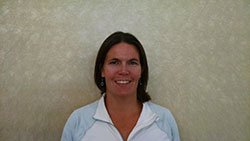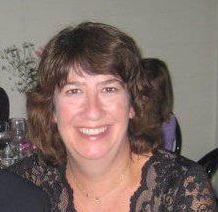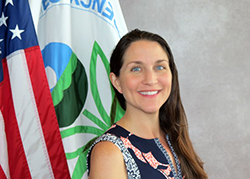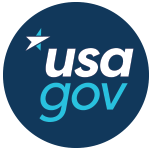RCRA Expert Brownbag Series
Sponsored by: Regions 1, 6, 9, and 10 and the Office of Resource Conservation and Recovery
Archived: Wednesday, October 4, 2017
RCRA's Land Disposal Restrictions Program - The New Challenges that Lie Ahead
Wednesday, October 4, 2017, 1:00 PM-2:00 PM EDT (17:00-18:00 GMT)
In 1984 as part of RCRA's Hazardous and Solid Waste Amendments (HSWA), the Land Disposal Restriction (LDR) program was born. The LDR program ensures that hazardous wastes are properly treated before they are land disposed. Although the core of the LDR regulatory program was completed by the late 1990's, issues regarding its implementation still arise. Recent events and investigations have uncovered certain industry practices that may not be keeping with LDR requirements. This presentation will explore those practices and discuss in detail the LDR issues that they raise.
Accessibility, Recording, and Content Disclaimer
Rehabilitation Act Notice for Reasonable Accommodation
It is EPA's policy to make reasonable accommodation to persons with disabilities wishing to participate in the agency's programs and activities, pursuant to the Rehabilitation Act of 1973, 29 U.S.C. 791. Any request for accommodation should be made to Jeff Norcross at 617-918-1839 or norcross.jeffrey@epa.gov, preferably one week or more in advance of the webinar, so that EPA will have sufficient time to process the request. EPA would welcome specific recommendations from requestors specifying the nature or type of accommodation needed. Please note that CLU-IN provides both alternate phone call-in options and closed captioning for all webinars, and requests for these specific accommodations are not necessary.
Webinar Recording
By participating in this CLU-IN webinar, you automatically agree to authorize recording of audio and visual content presented during this live event and consent to subsequent use of this recording in the public domain by the U.S. Environmental Protection Agency. This recording may include questions, comments and poll responses provided by you during the live event in addition to your name, voice, image or likeness. This recording will be made available after the conclusion of the live event as part of the CLU-IN webinar archives, and will remain available indefinitely. If you do not wish to consent to the recording, please do not join the live event, and contact Jean Balent at 202-566-0832 or balent.jean@epa.gov to discuss your concerns.
Content Disclaimer
This webinar is intended solely to provide information to the public. The views and opinions expressed as part of this webinar do not necessarily state or reflect those of the U.S. Environmental Protection Agency. It is not intended, nor can it be relied upon, to create any rights enforceable by any party in litigation with the United States, or to endorse the use of products or services provided by specific vendors. With respect to this webinar, neither the United States Government nor any of their employees, makes any warranty, express or implied, including the warranties of merchantability and fitness for a particular purpose, or assumes any legal liability or responsibility for the accuracy, completeness, or usefulness of any information, apparatus, product, or process disclosed, or represents that its use would not infringe privately owned rights.
Presenters:
Karen Sullivan, Office of Land and Emergency Management, Office of Communications, Partnerships and Analysis (sullivan.karen@epa.gov or 202-566-1259)
Underground Storage Tanks: Impact of the 3-Year Inspection Requirement on Compliance
Wednesday, February 1, 2017
Karen Sullivan is an economist in the Office of Land and Emergency Management‘s Office of Communications, Partnerships and Analysis. Karen has a PhD from the University of Rhode Island, and uses her expertise in environmental economics to conduct program and policy impact analyses for OLEM. Karen's contributions to OLEM were recognized in FY16 when she was selected as OLEM's Analyst of the Year. The work that Karen will present to you today was a collaborative effort with Achyut Kafle, who is also an economist and an ORISE Post-Doctoral Research Fellow in the same office. Last year this project was highlighted as one of two EPA projects in the White House Evidence Deputies Process—which was an effort to strengthen evidence work across the federal government.
Jeffry Fowley, Region I Office of Regional Counsel (former)
Looking at the Big Picture: the RCRA "Functional" Equivalency Policy and the Policy on More Stringent versus Broader in Scope
Wednesday, March 8, 2017
Jeffry Fowley was an EPA attorney in the Region I Office of Regional Counsel from 1980 through Jan. 2017 (when he retired). From 1996 to 2017 he served as the RCRA counseling attorney for the Region, including doing extensive state authorization work. He was a principal author of both the national policy on Equivalency ("functional equivalency"), and the national policy regarding how to determine whether state requirements are more stringent or broader in scope.
 Kathy Lett, U.S. EPA, Office of Resource Conservation and Recovery (Lett.Kathy@epa.gov or 703-605-0761)
Kathy Lett, U.S. EPA, Office of Resource Conservation and Recovery (Lett.Kathy@epa.gov or 703-605-0761)
Hazardous Waste Generator Improvements Rule ("Rule")
Wednesday, May 3, 2017
Kathy Lett has worked at EPA for 17 years, primarily on hazardous waste recycling and generator issues, as well as on energy conservation and wastewater management. Recently, Kathy has worked on universal waste, the definition of solid waste rulemaking and the Hazardous Waste Generator Improvements Rule. She has a BA from Hamilton College in Clinton, New York.
 MaryBeth Sheridan, U.S. EPA, Office of Resource Conservation and Recovery (Sheridan.Marybeth@epa.gov or 703-308-4941)
MaryBeth Sheridan, U.S. EPA, Office of Resource Conservation and Recovery (Sheridan.Marybeth@epa.gov or 703-308-4941)
Hazardous Waste Generator Improvements Rule ("Rule")
Wednesday, May 3, 2017
Mary Beth Sheridan has worked at EPA's Office of Resource Conservation and Recycling since 1997, primarily on hazardous waste recycling and the generator regulations. Before coming to EPA, Mary Beth worked as an environmental consultant, a technical writer for McCoy's Hazardous Waste Consultant, and at EPA's RCRA/Superfund Hotline. She has a B.S. from St. Lawrence University and a Master's degree from the University of Denver.
Lilybeth Colón, U.S. EPA, Office of Resource Conservation and Recovery (Colon.Lilybeth@epa.gov or 703-308-2392)
Post-Closure Care Guidance for Hazardous Waste Facilities
Wednesday, June 7, 2017
Lilybeth Colón is an Environmental Engineer in EPA Office of Resource Conservation and Recovery. Lilybeth has been part of EPA since 2011 and worked in the RCRA Hazardous Waste Permitting Program and the TSCA PCB Cleanup and Disposal Program since then.
Tricia Buzzell, U.S. EPA, Office of Resource Conservation and Recovery (Buzzell.tricia@Epa.gov or 703-308-8622)
Post-Closure Care Guidance for Hazardous Waste Facilities
Wednesday, June 7, 2017
Tricia Buzzell has been with EPA since 1987, working in Region 6 for three years before joining the Office of Resource Conservation and Recovery at EPA-HQ. Tricia has extensive experience with the RCRA Subtitle C hazardous waste management program, particularly in the areas of permitting, public participation, and corrective action.
 Gail Hansen, Office of Resource Conservation and Recovery (ORCR), Program Implementation and Information Division (PIID), Permits Branch (PB) (hansen.gail@epa.gov or 703-308-0463)
Gail Hansen, Office of Resource Conservation and Recovery (ORCR), Program Implementation and Information Division (PIID), Permits Branch (PB) (hansen.gail@epa.gov or 703-308-0463)
Introducing EPA's RCRA Training Website: Training Resources for EPA, States and Tribes
Wednesday, August 2, 2017
Gail graduated from Randolph-Macon Woman's College with a degree in biology and has a Master's degree in chemical hazard assessment from the University of Pittsburgh. She has worked as an environmental health scientist for EPA's ORCR since 1985, primarily on developing test methods to characterize hazardous waste (SW-846), hosting a Waste Testing and Quality Assurance Symposium (WTQA), serving as the office's web manager, and developing training documents for permit writers and a training website for regions, states and tribes. Before joining EPA, she worked as an analytical chemist for a consulting engineering firm.
Elaine Eby, EPA's Office of Land and Emergency Management (eby.elaine@epa.gov or 703-308-8449)
RCRA’s Land Disposal Restrictions Program – The New Challenges that Lie Ahead
Wednesday, October 4, 2017
Elaine Eby is an Environmental Scientist with EPA's Office of Land and Emergency Management. She started with EPA in 1979 as a summer intern. Upon finishing her graduate studies she joined EPA permanently in 1982 and has worked exclusively on RCRA and Superfund issues. She has been involved with LDRs since 1986 beginning with the Solvents and Dioxin Rule. Besides LDRs, Elaine has also worked in the following areas: petroleum gasification, Burden Reduction, CERCLA 108(b), and coal ash. She continues to work on LDRs issues as well as issues affecting the oil and gas industry.
Karen Scheuermann, U.S. EPA Region 9 (scheuermann.karen@Epa.gov or 415-972-3356)
Introducing EPA's RCRA Training Website: Greener and Cleaner: Reducing the Footprint at Your RCRA Corrective Action Site
Wednesday, December 6, 2017
Karen Scheuermann works in EPA Region 9's RCRA Program and has been involved with Greener Cleanups since 2008. She has expertise in environmental footprint analyses for cleanup sites and contributes to national efforts for developing Greener Cleanups metrics and best management practices.
Moderator:
 Jean Balent, U.S. EPA Technology Innovation and Field Services Division (balent.jean@epa.gov or 202-566-0832)
Jean Balent, U.S. EPA Technology Innovation and Field Services Division (balent.jean@epa.gov or 202-566-0832)
Ms Balent is on the staff of the EPA's Technology Innovation and Field Services Division where she has worked to collect and disseminate hazardous waste remediation and characterization information since 2003. Ms Balent manages the Clean Up Information Network website and actively supports online communication and collaboration resources available to EPA. She formerly worked with the US Army Corps of Engineers Environmental Engineering Division in the Buffalo District. Ms Balent was also a member of the SUNY-Buffalo Groundwater Research Group where she constructed and tested large scale models of groundwater flow. Ms Balent has also conducted research relating to the Great Lakes, environmental remediation, and brownfields re-development. She holds a Bachelor's degree in environmental engineering from SUNY-Buffalo and a Master's degree in Information Technology from AIU.
Webinar Slides and References:
-
 Slide Presentation for February 1, 2017 Webinar by Karen Sullivan and Achyut Kafle, Office of Land and Emergency Management, Office of Communications, Partnerships and Analysis (920KB/PDF)
Slide Presentation for February 1, 2017 Webinar by Karen Sullivan and Achyut Kafle, Office of Land and Emergency Management, Office of Communications, Partnerships and Analysis (920KB/PDF)
-
 Slide Presentation for March 8, 2017 Webinar by Jeffry Fowley, Region I Office of Regional Counsel (former) (92.3KB/PDF)
Slide Presentation for March 8, 2017 Webinar by Jeffry Fowley, Region I Office of Regional Counsel (former) (92.3KB/PDF)
-
 Slide Presentation for May 3, 2017 Webinar by Kathy Lett and MaryBeth Sheridan, U.S. EPA, Office of Resource Conservation and Recovery (1.06MB/PDF)
Slide Presentation for May 3, 2017 Webinar by Kathy Lett and MaryBeth Sheridan, U.S. EPA, Office of Resource Conservation and Recovery (1.06MB/PDF)
-
 Slide Presentation for June 7, 2017 Webinar by Tricia Buzzell and Lilybeth Colón, U.S. EPA, Office of Resource Conservation and Recovery (577KB/PDF)
Slide Presentation for June 7, 2017 Webinar by Tricia Buzzell and Lilybeth Colón, U.S. EPA, Office of Resource Conservation and Recovery (577KB/PDF)
-
 Slide Presentation for August 2, 2017 Webinar by Gail Hansen, Office of Resource Conservation and Recovery (ORCR), Program Implementation and Information Division (PIID), Permits Branch (PB) (92.0KB/PDF)
Slide Presentation for August 2, 2017 Webinar by Gail Hansen, Office of Resource Conservation and Recovery (ORCR), Program Implementation and Information Division (PIID), Permits Branch (PB) (92.0KB/PDF)
-
 Slide Presentation for October 4, 2017 Webinar by Elaine Eby, EPA's Office of Land and Emergency Management (42.1MB/PDF)
Slide Presentation for October 4, 2017 Webinar by Elaine Eby, EPA's Office of Land and Emergency Management (42.1MB/PDF)
Webinar Slides and References:
-
 Slide Presentation for February 1, 2017 Webinar by Karen Sullivan and Achyut Kafle, Office of Land and Emergency Management, Office of Communications, Partnerships and Analysis (920KB/PDF)
Slide Presentation for February 1, 2017 Webinar by Karen Sullivan and Achyut Kafle, Office of Land and Emergency Management, Office of Communications, Partnerships and Analysis (920KB/PDF)
-
 Slide Presentation for March 8, 2017 Webinar by Jeffry Fowley, Region I Office of Regional Counsel (former) (92.3KB/PDF)
Slide Presentation for March 8, 2017 Webinar by Jeffry Fowley, Region I Office of Regional Counsel (former) (92.3KB/PDF)
-
 Slide Presentation for May 3, 2017 Webinar by Kathy Lett and MaryBeth Sheridan, U.S. EPA, Office of Resource Conservation and Recovery (1.06MB/PDF)
Slide Presentation for May 3, 2017 Webinar by Kathy Lett and MaryBeth Sheridan, U.S. EPA, Office of Resource Conservation and Recovery (1.06MB/PDF)
-
 Slide Presentation for June 7, 2017 Webinar by Tricia Buzzell and Lilybeth Colón, U.S. EPA, Office of Resource Conservation and Recovery (577KB/PDF)
Slide Presentation for June 7, 2017 Webinar by Tricia Buzzell and Lilybeth Colón, U.S. EPA, Office of Resource Conservation and Recovery (577KB/PDF)
-
 Slide Presentation for August 2, 2017 Webinar by Gail Hansen, Office of Resource Conservation and Recovery (ORCR), Program Implementation and Information Division (PIID), Permits Branch (PB) (92.0KB/PDF)
Slide Presentation for August 2, 2017 Webinar by Gail Hansen, Office of Resource Conservation and Recovery (ORCR), Program Implementation and Information Division (PIID), Permits Branch (PB) (92.0KB/PDF)
-
 Slide Presentation for October 4, 2017 Webinar by Elaine Eby, EPA's Office of Land and Emergency Management (42.1MB/PDF)
Slide Presentation for October 4, 2017 Webinar by Elaine Eby, EPA's Office of Land and Emergency Management (42.1MB/PDF)
Additional Resources:
If you have a suggested topic or idea for a future CLU-IN internet seminar, please contact:
Technology Integration and Information Branch
PH: 202-566-0832 | Email: balent.jean@epa.gov
Technology Integration and Information Branch
PH: 202-566-0875 | Email: adam.michael@epa.gov





